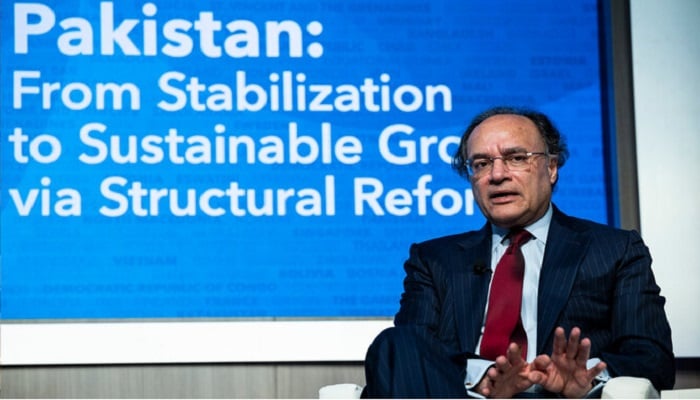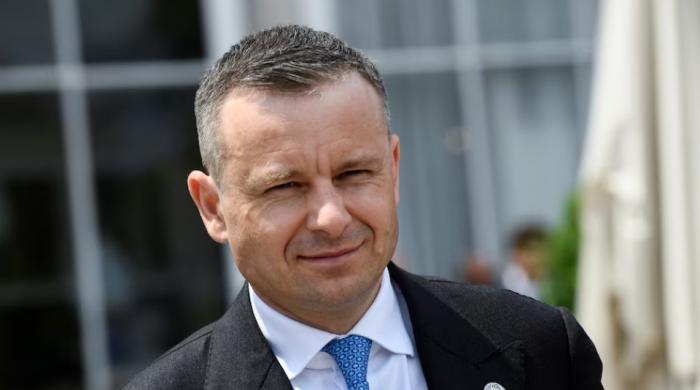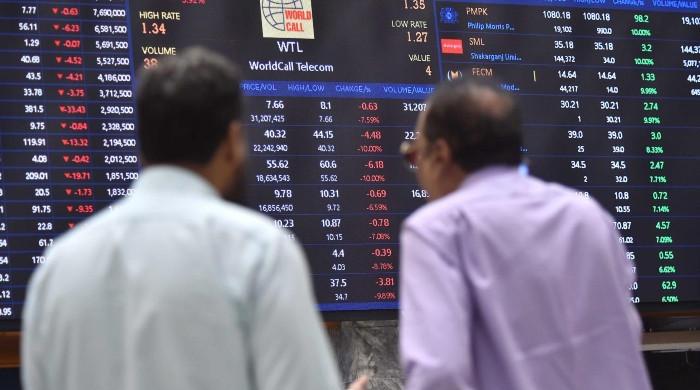Pakistan eyes end to IMF era, seeks 10bn yuan boost to China swap line
Govt focusing on rightsizing public sector and overhauling pension system, among other steps, says Aurangzeb
April 26, 2025

- Finance czar says govt making reforms in key areas to boost economy.
- Says recent steps helped stabilise economy, more efforts underway.
- Aurangzeb holds talks with several countries' finance ministers.
WASHINGTON: Finance Minister Muhammad Aurangzeb said Saturday that Pakistan has asked China to boost its currency swap line by 10 billion yuan ($1.4 billion), as the country pushes reforms and hopes to close the International Monetary Fund (IMF) chapter for good.
“The government is introducing reforms in areas such as rightsizing the public sector and overhauling the pension system,” Aurangzeb said, addressing a press conference after his week-long trip to the US to participate in the spring meetings of the IMF and the World Bank (WB).
The finance czar expressed hope that Pakistan’s current programme with the IMF would be its last, signalling the government’s intention to move towards economic self-reliance.
“The government’s recent steps have helped stabilise the economy, and that efforts are underway to increase private sector participation across various sectors,” the finance minister said.
Meanwhile, in an exclusive interview with Reuters on the sidelines of Washington meetings, Aurangzeb said, "Pakistan has put in a request to China to augment its existing swap line by 10 billion yuan ($1.4 billion), adding he expected the country would launch a Panda bond before year-end."
"Pakistan has an existing 30 billion yuan swap line already," the finance minister said, adding, "From our perspective, getting to 40 billion renminbi would be a good place to move towards ... we just put in that request."
China's central bank has been promoting currency swap lines with a raft of emerging economies, including the likes of Argentina and Sri Lanka.
Pakistan has also made progress on issuing its first panda bond, a debt issued on China's domestic bond market, denominated in yuan.
Talks with the presidents of the Asian Infrastructure Investment Bank (AIIB) and Asian Development Bank (ADB) — the two lenders who are in line to provide credit enhancements for the issue — had been constructive, he said.
"We want to diversify our lending base and we have made some good progress around that - we are hoping that during this calendar year we can do an initial print," he said.
Meanwhile, Aurangzeb expected the IMF executive board to sign off in early May on the Staff Level Agreement on its new $1.3 billion arrangement under a climate resilience loan programme, as well as the first review of the ongoing $7 billion bailout programme.
Getting the green light from the IMF board would trigger a $1 billion payout under the programme, which the country secured in 2024 and has played a key role in stabilising Pakistan's economy.
Asked about the economic fallout from the tensions with India following the killing of 26 men at a tourist site earlier this month, Aurangzeb said it was "not going to be helpful."
Trade flows between the two countries had already fallen off sharply following past frictions and totalled just $1.2 billion last year.











